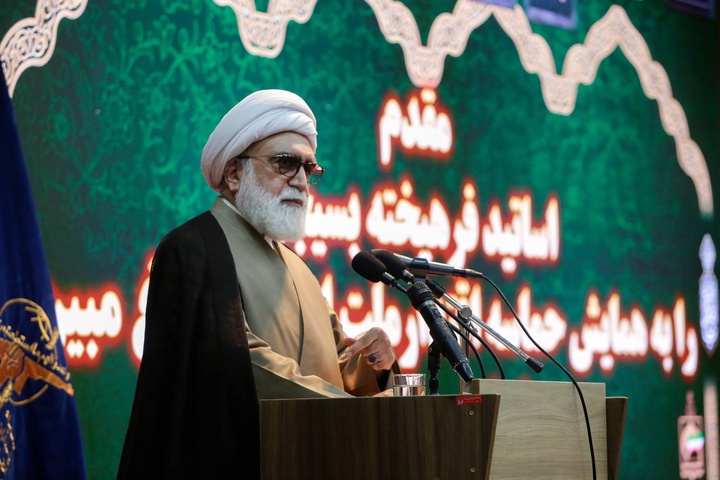Speaking to scholars from Qom Seminary at Velayat Complex in Mashhad, Ayat. Ahmad Marvi emphasized that no individual has the right to disrupt the unity of the Iranian nation in the face of its enemies. “National cohesion is the key to shaping Iran’s future”.
“Khordad 23 (June 13) was a turning point in the [rightful] path of the Iranian nation”, AQR’s head described.
Referring to the requirements of the new phase of the Islamic Revolution, the Ayatollah said: “The date marked a day when the entire nation, government, and armed forces participated in a historic test, once again demonstrating the true meaning of power, dignity, and unity”.
He called Khordad 23 the beginning of a new era in the Iranian nation’s movement.
“The simultaneous attack by two nuclear powers on Iran—using modern tools of hybrid warfare, beginning with the assassination of top military commanders and nuclear scientists and continuing with the killing of women, children, and men—alongside twelve days of honorable and resolute defense by the Iranian people under the wise and powerful leadership of the Leader of the Islamic Revolution, marked a historic moment”, the top official added.
The Custodian of Astan Quds Razavi stated: “Contrary to the enemies’ expectations, Iran neither collapsed nor retreated in the face of the sudden aggression. Instead, it displayed an exemplary resistance over twelve days. This steadfastness was a testament to the power, stability, and strength of the Islamic Revolution”.
Highlighting the Leader’s command and organizational skills during the crisis, Ayat. Marvi said: “One of the most admirable aspects of this period was the speed and precision in restructuring the military command system, which included swift replacement of commanders, formulation of defensive policy and operations, and their successful execution”.
“This”, he noted, “reflected the depth of Iran’s defensive preparedness and, more importantly, the masterful leadership of the wise, capable, and insightful Leader of the Islamic Revolution”.
He added that alongside military operations, the entire Iranian nation—regardless of different preferences, inclination, or sect—entered the field as a complementary force in defense. The national atmosphere turned into a vast trench for defending the country, a trench without borders, where every home and every heart became a bastion of resistance.
AQR’s Custodian stressed that national unity is the secret to Iran’s survival and victory. “The most important achievement of this period was not only on the battlefield but also in the social sphere. The Iranian people, through a profound experience, moved beyond grievances, complaints, and differences of opinion, and stood united, with one voice and one heart, behind the Leader of the Islamic Revolution to defend Iran’s dignity and independence.”
According to him, during the twelve-day war, political preferences, factions, and disputes disappeared, and everyone united around Iran with one voice. “This national cohesion is an invaluable asset that must be preserved and is a force that will build a more glorious future for Iran”.
Ayat. Marvi described the role of the Leader as the nation’s anchor in turbulent times. “In this crisis, the backbone of national resistance was formed by the unique role of the Leader of the Islamic Revolution. In his messages, the Leader not only gave hope, direction, and motivation to the people but also addressed the entire Iranian nation and emphasized the two foundational elements of national unity and social cohesion”.
He pointed to the failure of the enemy’s plan to subdue and divide Iran, stating, “The project launched against Iran was not merely a military operation but a multilayered and targeted scheme with two final goals: unconditional surrender and a shift in Iran’s strategic calculations, along with the disintegration of its territorial integrity. This project was led by arrogant powers who view Iran’s stability and strength as the main obstacle to their dominance in the region. However, with the presence of the Iranian people, this plan ended in fiasco”.
The Custodian of Astan Quds Razavi went on to say: “Preserving Iran’s dignity, independence, and power depends upon solidifying the position of the Leader in the minds and hearts of the society”.
“Some, under the guise of concern, speak of the influence of certain pressures on the Leader’s decisions. Those who make such claims do not understand the Leader and damage his standing. The Leader is never influenced by any pressure. To reinforce the position of the Leader, one must go beyond theoretical foundations and explain his unique role in crisis management, unifying the nation, and guiding the country through difficult conditions with dignity”, he noted.
Ayat. Marvi stated that vigilance, national cohesion, and loyalty to the Leader are essential requirements for the new phase of overcoming crises.
He believes that Iran is now at the beginning of a new era with special requirements. “This era will be accompanied by challenges and complexities, but with national cohesion, obedience to the Leader, strengthening public trust, focusing on priorities, and remaining alert to the enemy’s psychological warfare aimed at creating societal polarization, it can be transformed into an opportunity for growth and greater power for Islamic Iran”.
He concluded his remarks by noting the Leader’s appreciation and gratitude toward the Iranian people, saying, “This is proof of the need to preserve social cohesion and strengthen national unity. The cessation of hostilities does not mean the end of the war; the enemy is still lurking. This path must be continued together, with trust in God, rationality, and obedience to the Leader”.

The Custodian of Astan Quds Razavi (AQR) says no one has the right to undermine the unity of the Iranian nation against its enemies, stressing that national cohesion will determine the future of Iran.
News Code 6925

Your Comment